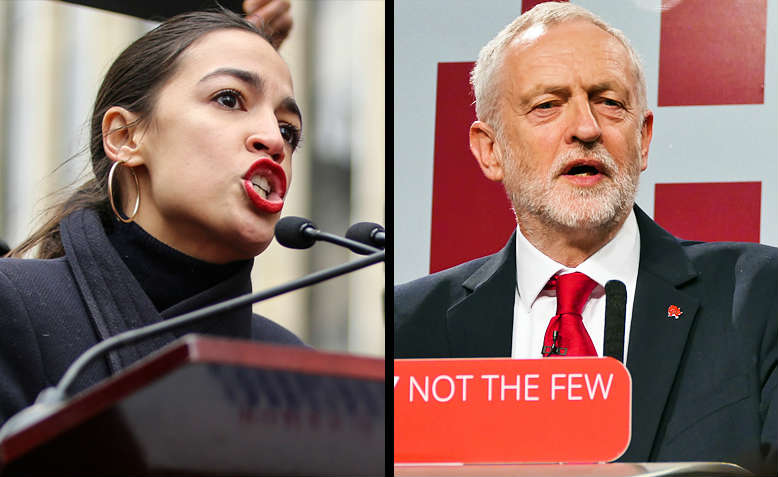 Alexandria Ocasio-Cortez, Photo: Flickr/Dimitri Rodriguez. Jeremy Corbyn, Photo: Wikimedia Commons
Alexandria Ocasio-Cortez, Photo: Flickr/Dimitri Rodriguez. Jeremy Corbyn, Photo: Wikimedia Commons
A Green New Deal, now a popular idea in Britain as well as the US, can help to merge environmental struggle with class struggle, argues Jago
Following the UN’s Intergovernmental Panel on Climate Change report from October last year, the estimates regarding global temperature rises made it very clear; only systematic, major changes to the world’s fuel economy can drag humanity out of the very potential situation of irreversible climate chaos. Neoliberal proposals such as renewable energy tax credits and fuel economy standards are simply not enough to shift the dangerous pathway that is climate change. The ‘Green New Deal’ (GND) proposal from America’s rising democratic-socialist movement could be the future for climate capitalism. However, as New York’s newly elected Congresswoman Alexandria Ocasio-Cortez experienced during the protest at Nancy Pelosi’s congressional office and depleted proposals for a ‘progressive’ Select Committee on a Green New Deal, it is clear the construction of a Green New Deal can only be achieved through progressive alliances.
Luckily for the UK, the Corbyn project can give the parliamentary presence needed for a Green New Deal to become realistic and achievable. AOC’s proposals on decarbonisation, jobs and justice can only be achieved through a progressive Corbyn government, where its broad agenda can interlink with Labour’s 2017 manifesto. However, Labour’s plans included pledges to deliver 60% of the UK’s energy demand from the zero carbon or renewable sources by 2030. The party’s proposals for mass public building construction can be instituted within a Green New Deal, 40% of annual US carbon emissions are linked to buildings. Essentially, those within Corbyn’s radical front bench must always consider the Green New Deal agenda when drawing up domestic policy.
The UK’s Green New Deal must be job-centred, where the redirection towards renewable energies can guarantee large-scale social-security programmes. Corbyn announced in late 2018 that Labour would create 400,000 skilled jobs alongside conference’s ‘The Green Transformation’ programme. This is the essential mechanism within the Green New Deal – such radical proposals must not be adopted by a mass-privatisation scheme like Thatcher’s 1980s destruction of industry and workers. Climate change can no longer be pursued by the political elite, as the interests of the working class have been ignored for business accumulation. The EU Commission’s “Emissions trading system” (ETS) as part of the “2020 climate & energy package” is a staunch reminder of global neoliberalism’s failure to institute needed structural transformations.
Spain’s small coal mine transition deals prove that unions and workers can be at the centre of renewable-transitioning. Pedro Sánchez’s Social-Democratic government invested €250 million into the Plan del Carbón deal, where previous workers of the closed coal mines are to be given financial and social support for retirement or re-training. With the correct economic investment into basic services, living wages and unionisation, the issue of climate change can go hand-in-hand with rebuilding Britain after almost nine years of austerity. Spain’s successful transition in carbon-reducing is based upon years of union and worker struggle, a Green New Deal introduced in the UK will still need to be incorporated with a strong union and socialist movement.
Labour’s taxation proposals and mass investment programme prove to be massively popular with polling and the electorate, and UK polling on a Green New Deal suggests an equally popular sentiment. This means Corbyn’s deeply inspirational visions of a Democratic-Socialist Britain can interlink with a potentially carbon-neutral one. America’s neo-cons and Britain’s Conservatives claim plans to tackle climate change ‘most affect working class people’. However, a Green New Deal coincides with working-class interest which trumps these backward and dangerous talking points.
Make no mistake, Labour’s environmentalism is far from perfect. Graham Stringer MP is tolerated by the party to spread his incredibly harmful and reactionary sentiments of climate change denial. 119 Labour MP’s voted in favour of Heathrow Airport’s third runway proposals, on the grounds of protecting and pursuing jobs for the west London area. Major union leaders such as Unite’s Len McCluskey supported the expansion, which shows our movement must start to build the sentiment of a jobs-first environmental programme where a pursuit to radically reduce the country’s carbon emissions only serves to harm tax-avoiding big business, not the working class.
Spain’s just transition gives hope to this possibility, although the UK would need a much larger investment deal. Due to unions’ justified anxieties around job losses as consequences of environmental policy, we must now start to build the argument of a progressive model to seriously tackle climate change. Ultimately, a Green New Deal would help to end the fantasies between environmentalism and neoliberal idealism.
The Intergovernmental Panel on Climate Change report proves that humanity’s grip on climate change is quickly loosening, global consumerist attempts such as ‘metal straws’ have proven to fail in countering the ecological crisis. Britain’s growing socialist movement serves to be the only possibility of climate change being haltered, arguments for the Green New Deal plan can help to merge environmental struggle with class struggle.

